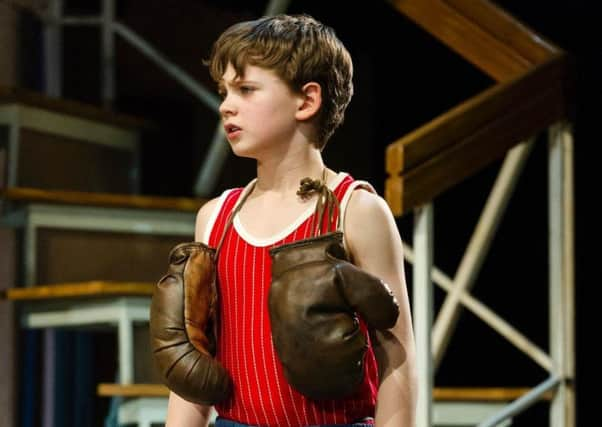Theatre review: Billy Elliot


Billy Elliot: The Musical
Playhouse, Edinburgh
JJJJ
There are two stories being told in Lee Hall’s great script for Billy Elliot, first seen in director Stephen Daldry’s award-winning 2000 film, and then in this equally acclaimed 2005 stage musical, with music by Elton John. It’s the interaction between those stories that gives both film and show their mighty, poignant resonance and power.
The first story has a tragic arc, and traces the death of a community, as the Durham mining village where the show’s 12-year-old hero has grown up fights its way through the 1984-5 miners’ strike, only to face the inevitability of defeat and decline. And the second soars upward, as young Billy accidentally discovers his talent for dance, and begins to find a kind of individual redemption and hope that will take him far from County Durham, and transform his life into something his widowed miner Dad, and militant, strike-leading older brother, can barely imagine.
Advertisement
Hide AdIn truth, this stage version of Billy Elliot is a scene or two too long, at more than three hours, and a shade too lavishly sentimental; Billy’s last long round of village farewells, including a final encounter with his beloved dead mother, could easily be concentrated into a more effective and less diffuse single scene.
Yet the show’s slight self-indulgence, towards the end, is a small price to pay for its huge political and emotional passion, and for the brilliance with which it reflects the shift in ideas about masculinity that accompanied the end of Britain’s great age of heavy industry, as Billy’s macho miner Dad – living in a profoundly homophobic culture, and beautifully played by Martin Walsh – gradually begins to understand the scale of his son’s talent, and the life it might bring him.
And always, at the core of this show, is the grace and power of the dance itself, captured in Peter Darling’s superb choreography, as little Billy – movingly played by Haydn May at the performance I saw – begins to learn how strength and endurance can coexist with grace and beauty, and how masculinity need not be defined by violence or aggression, or by any tribal, collective identity. It’s a hard lesson, and one that involves huge political pain and loss, as well as unimaginable gains for a gifted few. Yet in facing that truth, Billy Elliot tells the whole story of Britain since 1979 with a depth of compassion and understanding that both lifts the spirit, and often threatens to break the heart.
JOYCE MCMILLAN
Edinburgh Playhouse until 22 October, and on tour.